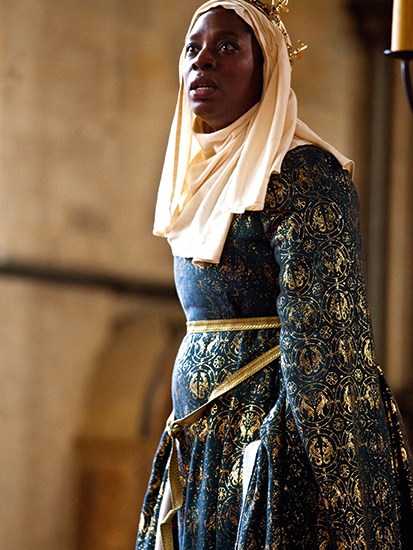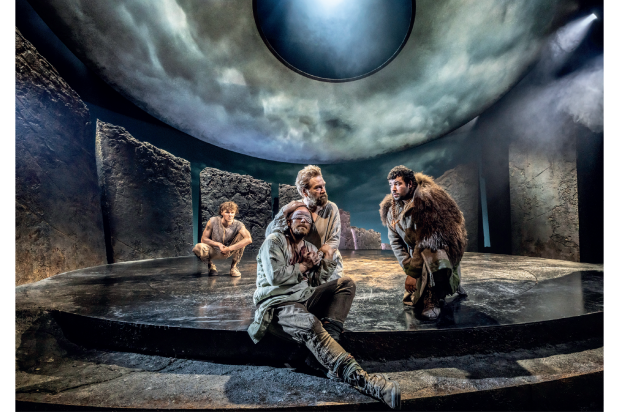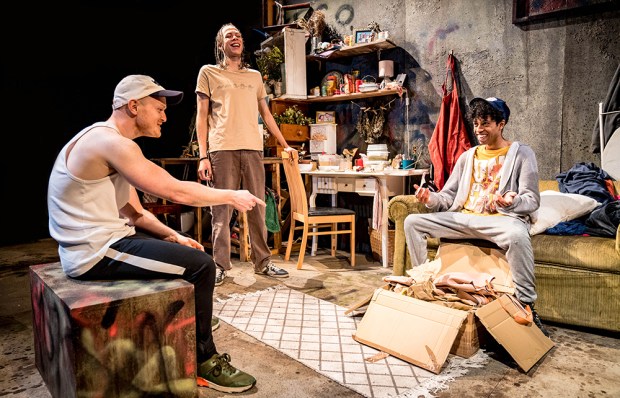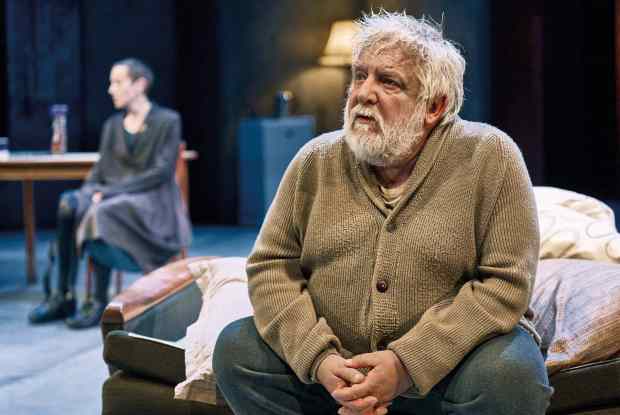King John arrives at the Globe bent double under the weight of garlands from the London critics. Their jaunt up to Northampton for the première seems to have cast an opiate glaze over their faculties. Plays that are rarely revived earn their hermit status for a reason. They lack social skills or winning graces. They’re hard to get on with. Shakespeare launches his account of the bad king’s ‘troublesome raigne’ by exploring the shadowy crenellations of Plantagenet genealogy. A decent cast performing at full whack to an eager crowd couldn’t keep my brain engaged. After 70 minutes, the folds of my eyes were feeling as heavy as piano lids.
Then, a sensation. A scene of extraordinary force and daring. The kings of England and France seal a peace treaty with a formal embrace. Freeze frame. Enter a papal nuncio. He excommunicates England and orders France to break the clinch and declare war on England or face the same penalty: banishment from heaven’s mercy. Amazing stuff. What would you do? What will France do? The French king begs Rome to reconsider but when his plea fails he betrays England, declares war and earns stinging reproofs from his new-won foe. A great scene. It’s not alone. Constance (played by Tanya Moodie) delivers a skin-prickling lament over her dead son. Quite a hankie-drencher. And there are moments when Shakespeare’s bitter lyricism mounts to a high pitch. ‘Life is as tedious as a twice-told tale/ Vexing the dull ear of a drowsy man.’ That could be Hamlet.
The finest moment is a torture scene which foreshadows Lear and which modern audiences will find enthralling because, being honest, very few of us have read the play and know what happens next. Hubert decides to blind young Arthur. Two masked thugs stand ready to perform the surgery. ‘Heat me these irons hot.’ In walks Arthur. He’s nice to Hubert. How are you? Keeping well? Feeling tired? Fancy a rest? Simplicity is the key here. Hubert’s kindness contrasts so naturally and yet so horribly with Hubert’s gruesome plan. Then Arthur discovers the conspiracy. He’s trussed to a chair. He pleads for clemency. This being Shakespeare, we expect maximum violence, maximum suffering. And the master delivers but not in the way we anticipated.
After this great scene, the tension disperses and the closing act is short of drama or pathos. I’m glad I spent three hours with the bad king but I doubt if even this classy production will give the play a permanent position in the canon. The verdict of four centuries can’t be wrong.
A new play about plays arrives in the West End. Crack the formula and you’ll make a fortune. Michael Frayn’s classic Noises Off showed us a company of thesps whose off-stage intrigues make nonsense of a sex farce. The Duchess’s current hit, The Play That Goes Wrong, is an antique thriller mangled by talentless players in a collapsing set. This newcomer, Stop — The Play, is set during the rehearsals of a show about an artistic genius working in a primary school. The script is constantly being overhauled by a prolific but indecisive playwright. He makes vast changes overnight. Huge roles are cut to a bare syllable. Cameos are turned into leading figures. Whole characters are cut. Fresh ones are demanded. A monkey that featured in an early draft is living in the rehearsal room where it uses the wardrobe as an ensuite bathroom.
There’s a lot to love about this play. The humour has a wide range. Subtle digs are aimed at over-flowery stage directions, and there are big broad swipes at pompous thesps. ‘I have no ego,’ declares the play’s star. ‘That’s why I became an actor.’ James Woolley is terrific as an old trouper who bores his colleagues rigid with actor-laddie tales. Trevor Griffiths wrote him out of a comedy in the third draft (‘the bastard’). He claims to have starred in an Athol Fugard play, wearing blackface, in 1981. Sounds far-fetched? Not at all. I saw Donald Sinden black up for Othello in the previous year.
My fear is that the focus here is too narrow. Press night was typically off balance. The stalls were filled with ‘friends and guests’ roaring at every syllable like the Falstaff Appreciation Society on crack. Around the edges sat the professional critics smiling and chuckling wryly. For actors this show is, literally, not to be missed. The same goes for anyone who’s spent time in a rehearsal room. But who’s left? The general audience. And they may feel that watching luvvies loving luvvies being luvvies is not a great night out.
Got something to add? Join the discussion and comment below.
Get 10 issues for just $10
Subscribe to The Spectator Australia today for the next 10 magazine issues, plus full online access, for just $10.
You might disagree with half of it, but you’ll enjoy reading all of it. Try your first month for free, then just $2 a week for the remainder of your first year.














Comments
Don't miss out
Join the conversation with other Spectator Australia readers. Subscribe to leave a comment.
SUBSCRIBEAlready a subscriber? Log in